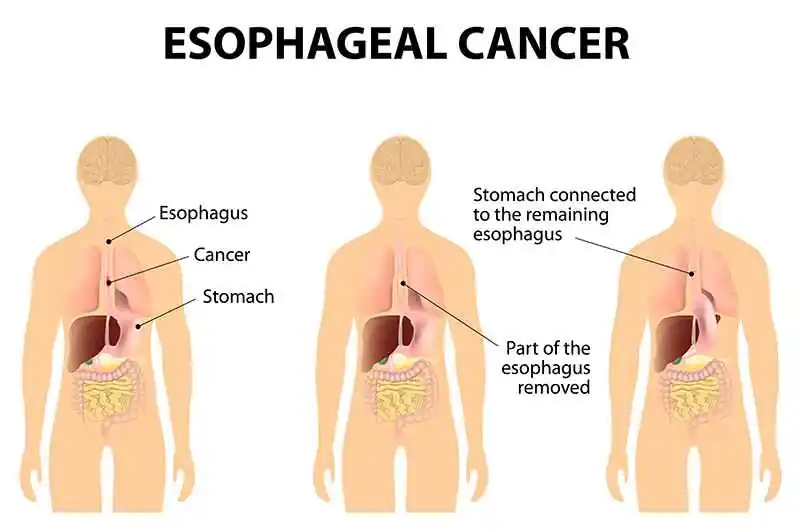All Insurance Covered
( Cashless / Reimbursement )



















Star Hospital is the best option for Esophageal Cancer Surgery in Jalandhar. It is a cancer that happens in the esophagus (food pipe). The esophagus is a muscular hollow tube; that travels from your throat to your stomach. The food Pipe helps shift the food you swallow from your throat (pharynx) to your stomach area for its digestion. Esophagus cancer generally starts in the cells present within the esophagus (food pipe). This cancer possibly occurs anywhere within the whole esophagus area. Compared to women, men are more prone and become prey to esophageal cancer. According to a research study, esophageal cancer ranks as the sixth most common reason for cancer deaths in the world. At the same time, different geographical locations might have little variations in this number. The leading causes of higher rates of esophageal cancer are credited to the usage of alcohol and tobacco and wrong lifestyle practices such as poor nutrition and obesity.


According to Healthcare it is not clear what causes exactly, but they have found factors of risk that increase the chance of developing esophageal cancer, these are some important causes that have a high chance of increasing Esophageal cancer:
Smoking and non-smoking tobacco
Drinking too much alcohol increases the risk of Esophageal Cancer
Choric acid reflux and Barrett’s esophagus: Chronic untreated acid reflux occurs when Barrett’s esophagus is a change in the cells at the lower end of the esophagus. without Barrett’s esophagus, long-term heartburn can increase the higher risk of esophageal cancer.
Spotlessly clean, profoundly caring. Our hospital ensures a pristine environment for your well-being
Our hospital has advanced technology gadgets and the best equipment in every field.
Our hospital team is dedicated and highly experienced in surgical field

Dysphagia(difficulty swallowing) is the first and the most common symptom of it:
chronic cough (Weight loss without any reason or effort)
vomiting
Pain in the chest, burning
Heartburn
Hoarseness
coughing up blood
Unintentional weight loss
It has many different types but we discuss some major types of Esophageal cancer:
Adenocarcinoma: The cells of the mucus-secreting glands in the esophagus are where adenocarcinoma starts. The lower part of the esophagus is where adenocarcinomas most frequently arise.
Squamous cell carcinoma: The thin, flat cells that border the esophageal surface are called squamous cells. Most cases of squamous cell carcinoma are seen in the middle and upper regions of the esophagus. Globally, squamous cell carcinoma is the most common kind of esophageal cancer.
Some other rare types of Esophageal cancer: small-cell carcinoma, sarcoma, lymphoma, melanoma, and choriocarcinoma are some rare types of Esophageal cancer.
Esophageal cancer treatment depends on the stage of the cancer. these are the treatment options:
Surgery: The most common treatment is Esophagectomy for early-stage esophageal cancer. it removes most of the esophagus and surrounding tissue.
Radiation therapy: It damages or kills cancer cells by targeting a radiation beam at the tumor.
Chemotherapy: It also kills cells which is the cause of cancer or stops them from developing.
The answer to this question is Yes, but you can control or reduce the risk by :
less drinking alcohol: because if you drink alcohol Frequently it increases the risk of Esophageal cancer.
Avoiding tobacco: it is another reason for esophageal returning.
Esophagectomies is one of the major operations — surgeons must cross two to three body cavities such as the abdomen, chest, and neck during the four- to six-hour procedure. Patients need to stay eight days to recover in the Hospital.
EXCELLENTTrustindex verifies that the original source of the review is Google. Thank you doctor Mandeep Kaur. I had a Positive result after 2 weeks of my IUI I am so happy I was waiting for so long to concive and to see 2 lines on my pregnancy test but every time that was unsuccessful but this was my first try with IUI and that’s go successfully thank you so much. 😊😊Posted onTrustindex verifies that the original source of the review is Google. Great experience with Dr. Mandeep and staff of the hospital.Posted onTrustindex verifies that the original source of the review is Google. My experience is very goodPosted onTrustindex verifies that the original source of the review is Google. Great Staff With good facilitiesPosted onTrustindex verifies that the original source of the review is Google. Thank you so much Dr mandeep from the bottom of hearts for taking such good care. Because of your professionalism and great smiles, we felt like we were in good hands and that gave us peace of mind towards the big day.Posted onTrustindex verifies that the original source of the review is Google. I got my friend’s weight loss surgery done at Star Hospital. We were impressed by Dr Ahluwalia’s clarity of thought on weight loss and Bariatric Surgery. We visited some other hospitals before and were always confused as their versions were very different but here we got answers to all our questions in a very clear way and my friend could gather courage to finally get his Bariatric Surgery done and start living a normal life again. Procedure went smooth as was told and we were out out of hospital very next day. Now we regret delaying this for years!Posted onTrustindex verifies that the original source of the review is Google. Dr Mandeep is a very hardworking and nice doctor.my result came positive and I'm very thankful to mam and all the staff members 🙏🙏